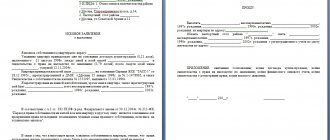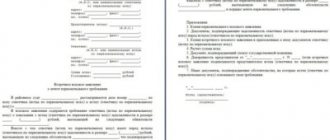Home / Housing disputes / How to evict a roommate from your apartment?
“Civil marriage” and cohabitation do not guarantee lifelong love and harmony. Very often, people’s paths diverge, which means it becomes necessary to evict a roommate from your apartment. If there are no conflicts, the person will move out on his own. But it also happens that the roommate harbors a grudge and refuses to move out of the apartment.
What to do in this case? Is it really possible to evict only the ex-spouse, but not to kick out the cohabitant? There are differences, of course. We offer step-by-step instructions and procedures on what to do if your roommate does not want to move out of your apartment.
We also recommend that you read “How to expel a roommate from an apartment without his consent?”
Reasons
Before talking about the grounds for eviction of a cohabitant, you should clarify the issue of ownership of the apartment. Evicting a “common-law spouse” on your own is only possible from a privatized apartment. If you lived in a municipal apartment under a social tenancy agreement, most likely your cohabitant has the right to use the living space. Consequently, eviction will only be possible on the basis of a court verdict.
Reasons why you can evict a roommate from an apartment:
- Decision of the owner, shareholders
The owner of the apartment, who has/has not registered a cohabitant, has the right to evict the tenant without explaining his wishes. The person being evicted will have to pack his things and leave the area he occupies. The decision to evict can also be made by shared owners, but their unanimous intention will be required.
- Damage to property
Troublemakers are evicted from the apartment first. Moreover, if a cohabitant causes damage to the property of the homeowner, the latter has the right to demand compensation for damage (Article 15 of the Civil Code of the Russian Federation).
- Violation of neighbors' rights
It happens that a roommate abuses alcohol, is addicted to drugs, triples rowdy behavior, and “poisons” the lives of the owners of other apartments. Neighbors have every right to complain to the housing authority and then impose severe sanctions on the offender. One of these is eviction from an apartment (see “How to evict noisy neighbors”).
The reasons may vary, but it is advisable to use them together.
Reasons and reasons
What are the grounds for eviction from an apartment of an unregistered person - not the owner? The housing stock is divided into 2 large categories - private stock and public.
The legislation identifies several grounds for eviction of persons from real estate that is not in federal or municipal ownership:
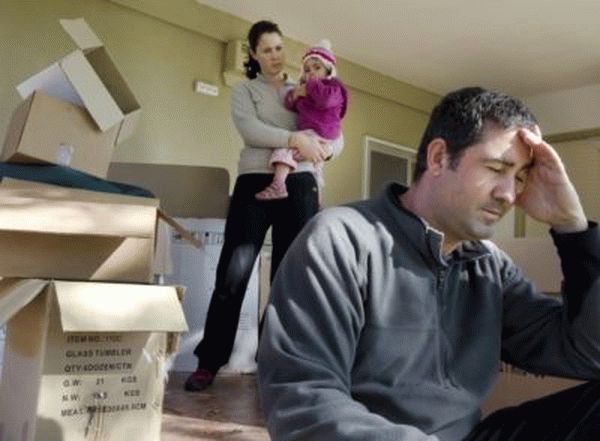
The citizen is not a member of the owner’s family and does not have the status of his dependent. For example, the owner's ex-husband after a divorce.
In this case, how can you evict your roommate from your apartment? If such a person has not received a share in the privatized real estate, then he can be deprived of the right to live in the apartment.
If the economic situation does not allow the evicted person to buy or rent another property, then he will be given the right to use the apartment for a limited period.
- The apartment was sold . If a person’s right of ownership has ceased, then the relatives of such a citizen no longer have the right to use this property. In a situation where people do not want to voluntarily vacate the premises, this can be done through the court. This provision is contained in Part 2 of Article 292 of the Civil Code of the Russian Federation.
- The property was secured by a mortgage loan. If there was a delay in repaying the debt obligation, then there is a legal basis for the sale of the residential premises. In this case, all residents are deprived of all rights to it. More details about this procedure can be found in the Law “On Mortgage”.
- In case of systematic violation of the rules of conduct in residential premises, ownerless use of property, violation of the rights of other citizens. The full range of reasons is contained in Part 2 of Article 35 of the RF LC.
You can learn about how people are evicted from mortgaged apartments from the video:
If a citizen lives in a non-privatized apartment, then there are the following grounds for eviction:
- Arrears of payment for the use of premises and utilities are not repaid within six months (Article 90 of the Housing Code of the Russian Federation).
- A citizen uses an apartment for other purposes than its intended purpose (for example, as a warehouse), violates the rules of use of the residence, or destroys real estate (for example, dismantles walls). This basis is provided for in Article 91 of the RF Housing Code.
- In cases provided for in Article 85 of the RF Housing Code.
- The move in was declared illegal. This is possible if a person moved into an apartment without the written consent of the tenant and his family members. In case of failure to comply with this formality.
- The period of use of the premises by temporary residents has ended. The tenant of a municipal apartment has the right to provide it for temporary use by people for a limited period of time. After its completion, persons must vacate the property (Article 80 of the RF Housing Code).
Read about how to file a claim for eviction from a municipal apartment here.
How to evict a person from an apartment in which he is not registered?
This is interesting: Preferential loans for agricultural producers in 2019: how are they provided?
How to evict a roommate from an apartment if he is not registered there?
The easiest way is to evict a cohabitant without his consent, if he is not registered in the owner’s apartment. But you need to remember that not all categories of tenants are subject to eviction.
The owner cannot evict:
- Dependent (disability + living with the owner of the home for 1 year or longer);
- Family member (by consanguinity or official marriage).
A cohabitant may be included in the first category, provided that he is financially supported by the owner of the apartment. Most likely, he will have “immunity” from eviction. If the cohabitant is not a dependent and is not registered in the apartment, eviction occurs as usual.
Example: While vacationing in Turkey, Ivleva met Cherkasov. Mutual sympathy arose, and upon returning from abroad, Cherkasov moved in with Ivleva. Registration in the apartment was not completed, because... the man was registered with his mother. Soon disagreements arose - Ivleva wanted to live with a “real man”, and her roommate did not work anywhere and abused alcohol. It happened that Cherkasov created inconvenience for his neighbors in the stairwell. Tired of endless conflicts, Ivleva turned to the district police officer with a complaint about her roommate. She said that the apartment belongs to her by right of ownership, Cherkasov is not registered there, violates public peace and does not want to move out voluntarily. The district police officer responded to Ivleva’s appeal, and soon Cherkasov was evicted from the apartment along with his belongings.
Procedure
Law enforcement agencies deal with issues of eviction of unwanted tenants. If the cohabitant is not registered in the apartment, the owner has every right to evict him even without consent. This is due to the provisions of Art. 209 of the Civil Code of the Russian Federation.
Instructions on how to evict a roommate if he doesn’t leave:
- Try to persuade him to move out voluntarily.
- Give notice of eviction within the prescribed period.
- Submit an application addressed to the district police officer.
- A police officer will visit the apartment, check the documents, and draw up a report on the residents living in the apartment.
- Drawing up an act of forced eviction of a cohabitant.
- Resident notification.
- Eviction from the apartment within the agreed period.
The owner of the apartment will not even need to resort to judicial recourse. It is enough to present documents for the apartment and declare that the roommate is an unwanted guest.
You can read more about the eviction of illegally residing people in our separate article.
Documentation
So, the eviction should take place in the near future - what documents will be needed from the apartment owner?
Prepare:
- an application addressed to the local detective officer (full name, rank, address of the stronghold and telephone number can be found on the business card or on the website of the Ministry of Internal Affairs);
- Russian passport;
- document of title (for example, an apartment purchase and sale agreement);
- extract from the Unified State Register of Real Estate (new version) or certificate of ownership (old sample);
- an extract from the house register - about how many people live in the apartment (no information about an unregistered roommate).
Expert opinion
Dmitry Nosikov
Lawyer. Specialization: family and housing law.
The very fact that the homeowner wants to evict his former partner is enough. But you can support your intention with evidence .
For example:
- testimony of neighbors and family members;
- the conclusion of the housing inspection about the violations of the cohabitant;
- copies of reports from the police, prosecutor's office (deviant behavior of the tenant);
- photos, audio and video recordings.
In a word, even if your roommate does not leave, you can find justice for him. Provided that registration in the owner’s apartment was not issued.
Statement to the police (sample)
An application to evict a tenant is filed at the local police station at the place of residence. The owner of the apartment must write an application on a ready-made A4 form in two copies.
Contents of the statement to the district police officer:
- Full name of the detective;
- title, position (current or temporary);
- Full name, passport details, address, telephone;
- further – by;
- description of the current problem, parties, right of residence, absence of such right, etc.
- information about the warning, notice or requirement to vacate voluntarily;
- an indication of the violated rights of the owner;
- request to pay a visit and take action (for example, evict an unregistered cohabitant in the apartment);
- Date of preparation;
- personal signature.
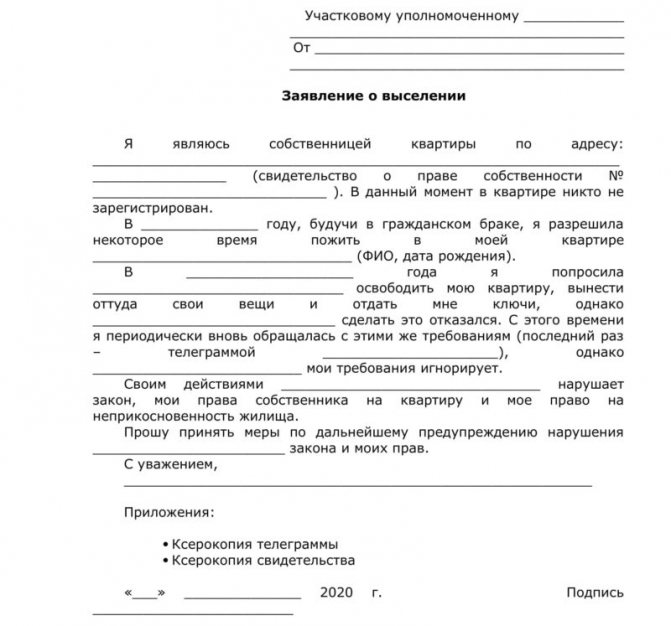
The applicant submits two copies of applications to the duty station or personally to the local police officer. You need to receive an application back with an acceptance stamp (spoof).
Deadlines
Verification of the requirements stated by the applicant usually takes 3 working days . Next, the district police officer contacts the owner of the apartment and arranges a visit. It is advisable that the cohabitant and his things be in the apartment - as proof of residence without registration. Eviction occurs within a period agreed in advance - no more than 6 days (but more often a week is given).
Price
Contacting a local police officer is free. The subsequent eviction of the “common-law husband” also occurs without financial costs on the part of the owner. Costs may be associated with obtaining a number of certificates. For example, a current extract from the USRN costs 460 rubles (previously 400 rubles).
Eviction of an unregistered spouse
Housing acquired during marriage is joint property, and after a divorce is subject to division, unless there are any conditions in the marriage contract. Eviction of one of the spouses usually occurs in the event of a divorce from an apartment purchased before marriage. In court, you must provide a divorce certificate as proof of the legality of these actions.
It doesn’t matter at all whether the tenant has a residence permit or not, except in the case of living in municipal housing, if the marriage of one of the spouses ends, the advantage of using the apartment ends. In other situations, all issues are considered in court.
1. If the spouse has not been registered, but is the owner of the apartment, then he cannot be evicted even through the court. Registration in this situation does not play a significant role.
2. If the premises were purchased on the basis of shared ownership of the property, then the spouse can purchase another part of the housing, but only by agreement.
This is interesting: Magnetic storms in June 2020: schedule by days and hours
3. If the living space was privatized, purchased before the wedding by one of the spouses, or gifted by inheritance, then after the divorce the other spouse may be deregistered without his consent. He is obliged to leave the housing, the owner of which is no longer related by family ties. If he refuses to do this voluntarily, then the issue is subsequently resolved at a court hearing. The court may give him a reprieve to look for other housing.
4. A child after the parents’ divorce is not a former family member. Until he reaches adulthood, he can live in the living space of one of his parents.
How to evict a roommate from an apartment if he is registered in it?
Most roommates trust their significant other so much that they immediately register them in the apartment. It would seem, what's wrong with that? In fact, registering a cohabitant creates problems with his eviction in the event of a breakdown in the relationship.
Appealing to the local police officer will not work here - you will have to involve neighbors, lawyers, acquaintances and evict the cohabitant without his consent in court.
Example: Heir S.A. Konyukhov became the owner of his grandmother's 2-room apartment. Soon the man met a woman, V.O. Yushina, who had nowhere to live due to moving to a new city. Konyukhov immediately registered Yushina with him. The lovers did not register their relationship with the registry office, but lived in the apartment as cohabitants. After some time, Yushina became an orphan, because... I lost my mother, and my father left a long time ago. Relations with Konyukhov did not work out; the owner demanded that Yushina move out of his apartment. The woman had nowhere to go, and she refused.
Konyukhov filed a lawsuit for the forced eviction of his cohabitant. The plaintiff claimed that he was the owner and wanted to write out and evict the defendant, but she did not agree. After hearing the parties, the court decided to refuse to evict Yushina. Considering that the defendant was left an orphan and did not have the opportunity to rent housing, the court delayed the eviction from Konyukhov’s apartment. Even despite the “cohabitation” status, it was decided to give a short delay until Yushina received housing under a social tenancy agreement as a low-income person.
Eviction algorithm
A cohabitant registered in an apartment cannot be considered to have moved in without permission. The owner always gives consent to registration. If eviction is carried out, it is not much different from the usual procedure: voluntarily by the cohabitant or forced by the court.
Step-by-step algorithm:
Step #1. Make sure that your roommate does not want to move out voluntarily.
Step #2 . Pre-trial order (negotiations, persuasion, demands).
Step #3 . Prepare evidence (precinct police report, witnesses, photos, videos, documents).
Step #4 . A statement of claim to the court for the forced eviction of a cohabitant.
Step #5 . Receive a copy of the court decision (writ of execution).
Step #6 . Remove your partner from registration (UVM or MFC).
Step #6 . Write a statement to the bailiff service or contact the local police officer.
Step #7 . The process of evicting a registered tenant.
List of documents
Applying for the forced eviction of a former cohabitant requires the preparation of documents - not only for eviction, but also for discharge (the first cannot happen without the second).
The plaintiff is required to provide:
- 3 copies of the statement of claim for the eviction of the registered partner (for yourself, the defendant and the judge);
- a copy of the Russian passport (the original will be required at the court hearing);
- documents for the apartment - a color certificate or a modern extract from the Unified State Register of Real Estate;
- the reasons why the owner evicts the cohabitant (living at a different address, non-payment of housing and communal services, damage to property, negativity towards neighbors, illegal redevelopment of the house);
- extract from the house register (archive);
- original receipt for payment of state duty.
The main condition for providing documents is to hand over to the secretary of the district court not the originals (duplicates), but their copies. Subsequently, the complainant will be asked to confirm the copy of the passport with the corresponding original.
Statement of claim (sample)
The structure of the statement of claim deserves special attention. Since we are interested in eviction of a tenant who is registered in the apartment, the name of the statement of claim will be standard. More on this below.
What to include in the statement of claim:
- name of the district judicial authority;
- Full name, passport details, addresses and telephone numbers of the participants in the process;
- the title of the claim is “Statement of Claim for the loss of the cohabitant’s right to use housing...”;
- why the plaintiff wants to evict the defendant;
- grounds for forced removal of a cohabitant;
- confirmation of your legal intentions (articles of the Civil Code, LC, etc.);
- a list of documents that go along with the claim;
- date and signature of the plaintiff.
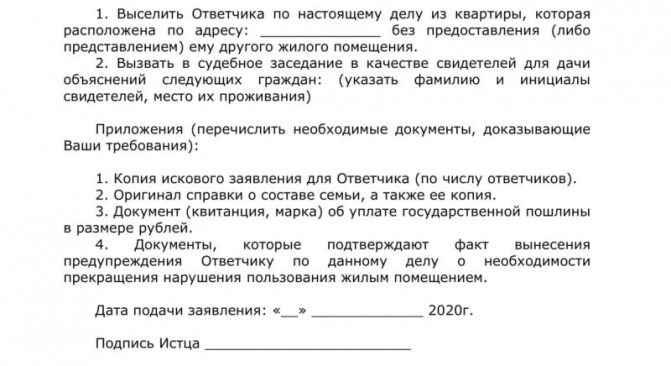
As has been said many times, the number of claims must correspond to the number of participants in the process. Usually this is 3 copies (for the plaintiff, the defendant and the judge). It is better to take care of this in advance.
You will find useful recommendations on how to draw up a statement of claim for eviction in our material.
Deadlines
How long does it take to evict a roommate if he is registered in the apartment? It is impossible to answer the question unequivocally - court hearings can last up to six months, have counter-claims, and be complicated by appeals and complaints.
If we talk about an approximate period - 2-4 months with an increase in the period (Article 154 of the Code of Civil Procedure of the Russian Federation). Following the litigation comes the eviction itself. It takes about 3-7 days , but sometimes longer. For example, if a cohabitant refuses, you will have to involve bailiffs. As a result, the period will increase by 2-3 weeks. However, the efforts will not be in vain - the cohabitant will sooner or later move out of the owner’s apartment.
Expenses
The price list for filing claims is described in Art. 333.19 Tax Code of the Russian Federation. The plaintiff pays for the claim that he files against the defendant. If two or more claims are made, several claims can be filed, or they can be formed in one statement of claim.
The cost of filing a claim to evict a cohabitant is 300 rubles . Immediately after payment you need to take the receipt and attach it to the documents. Payment is made through the bank's cash desk or payment terminals - at the choice of the plaintiff.
Tenants without the right to evict
Recently, the Supreme Court, reviewing one of these cases, stated that there are situations where the owner of the property cannot demand the eviction of strangers. This verdict of the Supreme Court is very important for a considerable number of citizens - you always need to know in which cases the law is not on the side of the owner of square meters.
It all started when a certain citizen, a resident of Kazan, went to court with a demand to expel several people from her apartment without providing other housing. The woman became the owner of the home after the death of her father. During his life, the head of the family, his daughter and son and his family - his wife and two children - lived in this three-room apartment.
The heirs in the end turned out to be two adult children of an elderly man - our plaintiff and her brother. Each of them got half of the apartment. But by the time the inheritance appeared, the brother had already divorced his wife and left, and gave his part of the inherited apartment to his sister. The “gift” turned out to come with a burden: the brother’s ex-wife and her two children lived and remained registered in the three-ruble ruble. Having become the new owner of the apartment, the woman decided that the law was on her side and she had the right to evict her brother’s ex-wife as a stranger. She also included her own nephews in the category of strangers, explaining in the lawsuit that the tenants were not members of her family. My brother’s ex-wife and children filed a counterclaim - leave us in the apartment where we legally lived for many years.
At first, everything seemed to work out for the plaintiff. The Volga District Court of Kazan sided with her and decided that the strangers should leave. But the court “humanely” allowed them to stay in the apartment for another year, and then go to all four directions. The Supreme Court of the Republic of Tatarstan agreed with this verdict.
Having become the owner of the apartment, the woman decided that she had the right to evict her brother’s ex-wife as a stranger
The ex-wife and her children had to appeal to the country's Supreme Court. They checked the correctness of the decision and stated that the local courts had violated the law and incorrectly resolved the dispute.
At the very beginning of the nineties, the executive committee issued a warrant to the family in question. The apartment was suitable for a family of five. Let us clarify - for a family, which included a woman, then still a legal wife, with two, then still minor, children. The apartment was cooperative. Everything was paid on time. There is a document about this, on the basis of which the head of the family’s ownership of square meters was registered. The first courts, evicting the brother's former family, referred to Article 31 of the Housing Code. It says that these people are not members of the owner's family. This means that they are alien citizens. The Supreme Court objected to all this - the warrant was issued for five people as one family. And no one recognized this order as illegal within the period established by law (which is three years). And from this follows an unpleasant conclusion for the new owner - each of the members of the once large family was at one time legally accepted as members of the housing cooperative and, being listed in the order, acquired the independent right to live in this apartment.
Article 31 of the Housing Code, which local courts have always referred to, lists who can be discharged from private housing after these people are no longer considered members of the owner’s family. But in our case, the woman and her children did not move into the disputed apartment as members of the current owner’s family. And they independently acquired the right to live in the apartment long before the new owner arrived. Therefore, Article 31 of the Housing Code cannot be applied to these people, the Supreme Court said.
Help "RG"
Part 1 of Article 31 of the Housing Code provides that family members of the owner of a residential premises include those living together with this owner, in the residential premises belonging to him, his spouse, as well as the children and parents of this owner.
Other relatives, disabled dependents and, in exceptional cases, other citizens may be recognized as members of the owner’s family if they are settled by the owner as members of his family.
In what cases will a roommate not be evicted?
Many people ask whether it is always possible to evict a roommate?
Despite the difference in situations, the law identifies several grounds when it will not be possible to evict a common-law husband/wife:
- The cohabitant is included in the social tenancy agreement as a family member - and the agreement has not yet lost legal force.
- The person being evicted is raising minor children and has nowhere to live - the courts often cooperate and grant a reprieve (see “Eviction of minor children from residential premises”).
- The cohabitant has health problems (for example, incapacity or disability of I-II degree).
- Availability of mortgage payment receipts on a par with the owner of the apartment.
- Participation in the reconstruction or repair of residential premises - for which there must also be confirmation (checks, receipts, invoices, contract agreements, receipts).
How to insure yourself in case of unforeseen situations? The most reasonable thing is to conclude an apartment rental agreement (rent) with your cohabitant. It is not necessary to pay in full: it is enough to pay utility bills and meters. The expiration/termination of such an agreement automatically obliges the cohabitant to move out of the apartment.
Arbitrage practice
When considering cases of eviction of citizens, courts are guided by the provisions of Art. 194 of the Code of Civil Procedure of the Russian Federation “Adopting a court decision.” Judges take into account not only the interests of the plaintiff, but also the life situation of the defendant. For example, if this is a dependent, they will definitely delay the eviction, or they may even refuse it altogether.
It happens that the parties manage to reconcile - sometimes right in the courtroom. Next comes the conclusion of a settlement agreement - this may take some time. The agreement between the plaintiff and the defendant is approved by the court. The terms and conditions are binding.
For example:
- the owner allows the cohabitant to live with him for a while;
- the cohabitant is looking for a new place to live and moves out in a month;
- the defendant compensates for material damage and remains to live with the owner;
- The plaintiff enters into a rental agreement with his cohabitant and moves out of the apartment.
It happens that cohabitants have common property. Read how property is divided in a civil marriage?
Eviction of a roommate through court
The statement of claim to the court is drawn up in accordance with the rules of Art. 131 and 132 of the Code of Civil Procedure of the Russian Federation. The text of the claim must include:
- name of the court to which the application is filed;
- identification data of the plaintiff and defendant - full name, residential address, contact information;
- description of the situation;
- claim to court;
- list of attached documents;
- date;
- signature.
In fact, the cohabitant, if the owner is against it, is on his territory illegally. In most cases, in practice, the court sides with the plaintiff. An exception will be the defendant's presentation of evidence that indicates the existence of the right to use the apartment.
The statement of claim is sent to the court office. It will be reviewed for correctness within five days and then accepted or rejected. Further review may take up to two months.
During the legal proceedings, the interests of all parties to the dispute will be taken into account. If necessary, third parties will be involved in the process - neighbors, prosecutor, guardianship authorities, etc.
Why such difficulties, because according to the logic of things, the cohabitant does not have the right to live in the apartment? The fact is that eviction is an extreme and undesirable measure that contradicts the Constitution of the Russian Federation. The judge will definitely try to reconcile the parties and resolve the dispute peacefully.
If difficulties arise, please seek legal advice. You can get free legal assistance on our website. in a special window.
Now you know how to kick your roommate out of the house if he doesn't leave. It is better to try to resolve the issue peacefully, since legal proceedings require a lot of time and effort. In any case, consulting a competent lawyer will not be superfluous. Describe the situation to our expert in a special window.
